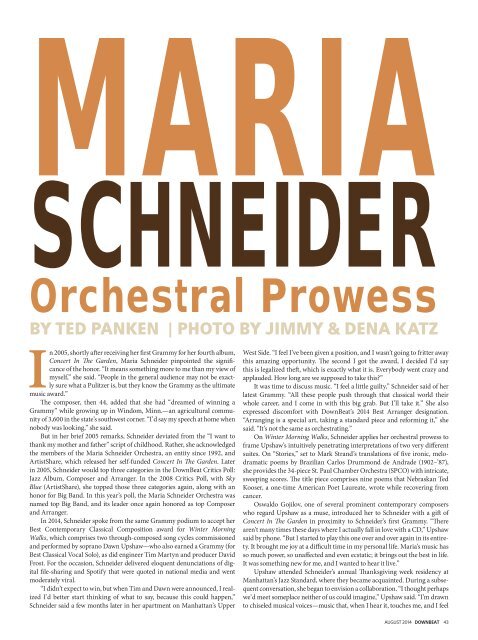You also want an ePaper? Increase the reach of your titles
YUMPU automatically turns print PDFs into web optimized ePapers that Google loves.
MARIA<br />
SCHNEIDER<br />
Orchestral Prowess<br />
BY TED PANKEN | PHOTO BY JIMMY & DENA KATZ<br />
In 2005, shortly after receiving her first Grammy for her fourth album,<br />
Concert In The Garden, Maria Schneider pinpointed the significance<br />
of the honor. “It means something more to me than my view of<br />
myself,” she said. “People in the general audience may not be exactly<br />
sure what a Pulitzer is, but they know the Grammy as the ultimate<br />
music award.”<br />
The composer, then 44, added that she had “dreamed of winning a<br />
Grammy” while growing up in Windom, Minn.—an agricultural community<br />
of 3,600 in the state’s southwest corner. “I’d say my speech at home when<br />
nobody was looking,” she said.<br />
But in her brief 2005 remarks, Schneider deviated from the “I want to<br />
thank my mother and father” script of childhood. Rather, she acknowledged<br />
the members of the Maria Schneider Orchestra, an entity since 1992, and<br />
ArtistShare, which released her self-funded Concert In The Garden. Later<br />
in 2005, Schneider would top three categories in the DownBeat Critics Poll:<br />
Jazz Album, Composer and Arranger. In the 2008 Critics Poll, with Sky<br />
Blue (ArtistShare), she topped those three categories again, along with an<br />
honor for Big Band. In this year’s poll, the Maria Schneider Orchestra was<br />
named top Big Band, and its leader once again honored as top Composer<br />
and Arranger.<br />
In 2014, Schneider spoke from the same Grammy podium to accept her<br />
Best Contemporary Classical Composition award for Winter Morning<br />
Walks, which comprises two through-composed song cycles commissioned<br />
and performed by soprano Dawn Upshaw—who also earned a Grammy (for<br />
Best Classical Vocal Solo), as did engineer Tim Martyn and producer David<br />
Frost. For the occasion, Schneider delivered eloquent denunciations of digital<br />
file-sharing and Spotify that were quoted in national media and went<br />
moderately viral.<br />
“I didn’t expect to win, but when Tim and Dawn were announced, I realized<br />
I’d better start thinking of what to say, because this could happen,”<br />
Schneider said a few months later in her apartment on Manhattan’s Upper<br />
West Side. “I feel I’ve been given a position, and I wasn’t going to fritter away<br />
this amazing opportunity. The second I got the award, I decided I’d say<br />
this is legalized theft, which is exactly what it is. Everybody went crazy and<br />
applauded. How long are we supposed to take this?”<br />
It was time to discuss music. “I feel a little guilty,” Schneider said of her<br />
latest Grammy. “All these people push through that classical world their<br />
whole career, and I come in with this big grab. But I’ll take it.” She also<br />
expressed discomfort with DownBeat’s 2014 Best Arranger designation.<br />
“Arranging is a special art, taking a standard piece and reforming it,” she<br />
said. “It’s not the same as orchestrating.”<br />
On Winter Morning Walks, Schneider applies her orchestral prowess to<br />
frame Upshaw’s intuitively penetrating interpretations of two very different<br />
suites. On “Stories,” set to Mark Strand’s translations of five ironic, melodramatic<br />
poems by Brazilian Carlos Drummond de Andrade (1902–’87),<br />
she provides the 34-piece St. Paul Chamber Orchestra (SPCO) with intricate,<br />
sweeping scores. The title piece comprises nine poems that Nebraskan Ted<br />
Kooser, a one-time American Poet Laureate, wrote while recovering from<br />
cancer.<br />
Oswaldo Gojilov, one of several prominent contemporary composers<br />
who regard Upshaw as a muse, introduced her to Schneider with a gift of<br />
Concert In The Garden in proximity to Schneider’s first Grammy. “There<br />
aren’t many times these days where I actually fall in love with a CD,” Upshaw<br />
said by phone. “But I started to play this one over and over again in its entirety.<br />
It brought me joy at a difficult time in my personal life. Maria’s music has<br />
so much power, so unaffected and even ecstatic; it brings out the best in life.<br />
It was something new for me, and I wanted to hear it live.”<br />
Upshaw attended Schneider’s annual Thanksgiving week residency at<br />
Manhattan’s Jazz Standard, where they became acquainted. During a subsequent<br />
conversation, she began to envision a collaboration. “I thought perhaps<br />
we’d meet someplace neither of us could imagine,” Upshaw said. “I’m drawn<br />
to chiseled musical voices—music that, when I hear it, touches me, and I feel<br />
AUGUST 2014 DOWNBEAT 43


